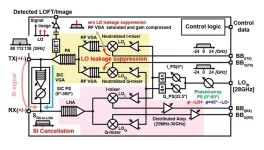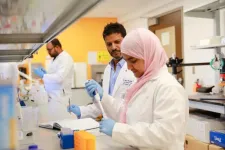(Press-News.org) New research has revealed there is a gap between how people imagine they’d act if sexually harassed and how those who experience it respond.
The study by the University of Exeter, funded by the Economic and Social Research Council and published in Psychology of Women Quarterly, discovered that seeking justice by coming forward is just one of the needs people who experience sexual harassment consider after the event, with other needs, including those for safety, instead rated as more important.
The research may explain why people who are sexually harassed often don’t report their experience formally, with the 2017 Crime Survey England and Wales finding that five out of six people who are targeted by sexual offences do not report it to the police.
Researchers compared answers from a confidential online survey from people who have experienced sexual harassment to those who have not but were asked to imagine how they would react. People who have experienced sexual harassment reported a range of needs and engaged in a variety of actions to meet these needs. Needs for safety, personal control and social support were prioritised over formal actions, such as reporting to police. Those who had not encountered sexual harassment anticipated having stronger needs and taking more actions—especially formal ones.
Senior author, Professor Manuela Barreto, from the University of Exeter said: “We found there is a widely held belief that quick and formal reporting is the correct response to sexual harassment. It’s what’s generally meant with the phrase ‘coming forward’. Yet most people who are sexually harassed do not report it formally and those who do, often report the offence a significant time after it happened. There’s a focus on procedural barriers with police and other authorities as to why this is, but less attention paid to the actual needs of the person who has experienced sexual harassment.
“Our research suggests there’s a gap between what people expect from those who have been sexually harassed and how those who experience it actually respond. It’s important to consider that the feelings and actions of someone who has experienced sexual harassment might be very different from those who have not. Instead of asking; ‘why people don’t come forward more often?’, we should perhaps ask ourselves; ‘what is the best action for the individual?’”
Across two studies researchers analysed answers from participants who have experienced sexual harassment about the actions they took, alongside those from participants who haven’t experienced sexual assault but were asked to imagine how they’d react if they did. In the first study 415 participants from mixed genders took part (259 experienced, 156 imaginers) and after finding no gender differences, the second study was conducted with women only (589 participants – 301 experienced, 288 imaginers), who are much more commonly sexually harassed.
Lead author, Professor Thomas Morton, worked at the University of Exeter on the research and is now at the University of Copenhagen. He said: “There is an assumption that those who experience sexual harassment are primarily guided by their desire for justice. But this research shows that peoples' needs are wider than what others might expect, and include needs for safety, personal control, and for life to just return to normal. Of all the needs that people expressed, the need for justice was not the highest priority. This might explain why people don’t take the kind of formal actions, like reporting to police, that others expect them to.
“There are often accusations – including high profile recent examples – that if people who experience sexual harassment don’t come forward at the time, it’s because it wasn’t that serious or perhaps even true. But if you have not experienced sexual harassment, it is hard to accurately anticipate what you might need, and therefore what you would do to satisfy those needs. Our research suggests that the assumptions people make are often wrong, or at least don’t reflect what the people who have experienced sexual harassment say they need.”
The paper is entitled “What Would a “Reasonable Person” Do? Exploring the Gap Between Experienced and Anticipated Responses to Sexual Harassment”, and is published in Psychology of Women Quarterly
ENDS
END
Study highlights why people who are sexually harassed might not come forward immediately, or at all
New research has revealed there is a gap between how people imagine they’d act if sexually harassed and how those who experience it respond.
2023-06-09
ELSE PRESS RELEASES FROM THIS DATE:
New high-tech helmets may protect American football players from debilitating concussions
2023-06-09
Millions of people in the US are concussed every year playing sports. Players of games like American football are at particularly high risk for injuries that can have devastating long-term consequences. Stanford University scientists working with the company Savior Brain have now designed one potential way of protecting players: a helmet containing liquid shock absorbers that could reduce the impact of blows to the head by a third.
“Most of the members of our team have a personal connection to traumatic brain injury and we care deeply about ensuring long-term ...
Genomic resources to help boost climate resilience of fisheries
2023-06-09
Candidate genes that could help fish to tolerate warmer and saltier water have been identified in new research from the Earlham Institute, potentially providing a vital resource to guide breeding programmes in freshwater aquaculture.
As water quality and availability is reduced by higher global temperatures, these insights can be used to breed more resilient fish and safeguard a key source of food for millions of people.
The Nile tilapia, Oreochromis niloticus, is widely farmed in freshwater aquaculture, providing essential nutrients and protein. Their use in aquaculture has risen dramatically, largely due to their adaptability to different water conditions and ...
New method takes the uncertainty out of oxide semiconductor layering
2023-06-09
Tokyo, Japan – 3D integrated circuits are a key part of improving the efficiency of electronics to meet the considerable demands of consumers. They are constantly being developed, but translating theoretical findings into actual devices is not easy. Now, a new design by a research team from Japan can turn these theories into reality.
In a study recently published for the VLSI Symposium 2023, researchers from Institute of Industrial Science, The University of Tokyo have reported a deposition process for nanosheet oxide semiconductor. The oxide semiconductor resulting from this process has high carrier mobility and reliability in transistors.
3D ...
Preparing the stage for 6G: A fast and compact transceiver for Sub-THz frequencies
2023-06-09
New transceiver design capable of both transmission and reception at frequencies over 100 GHz and at 112 Gb/s data rate could pave the way to 6G technologies, as reported by scientists at Tokyo Tech. By effectively suppressing the self-interference caused by the transmission signal leaking into the receiver, the proposed architecture reaches unprecedented data rates while maintaining a surprisingly compact size.
Scientists and engineers in the field of telecommunications are already working on the technologies that will be used for sixth generation (6G) networks. Ideally, 6G should deliver data rates of ...
Researchers to explore potential of new treatment against vascular dementia
2023-06-09
EL PASO, Texas (June 8, 2023) – Researchers from The University of Texas at El Paso’s School of Pharmacy will explore the viability of a new treatment for vascular dementia, thanks to a $2.2 million grant from the National Institutes of Health (NIH) National Institute of Neurological Disorders and Stroke (NINDS). The grant builds on work that’s previously been done by the team and their collaborators.
Vascular dementia — the second most common type of dementia worldwide — ...
Ancient herbivore’s diet weakened teeth leading to eventual starvation, study suggests
2023-06-09
A team of researchers from the University of Bristol have shed light on the life of the ancient reptile Rhynchosaur, which walked the earth between 250-225 million years ago, before being replaced by the dinosaurs.
Rhynchosaurs are a little-understood group of roughly sheep-sized ancient reptiles that thrived during the Triassic Period, a time of generally warm climates and tough vegetation.
In the new study, the researchers studied specimens found in Devon and used CT scanning to see how the teeth wore down ...
Personalized vaccines may revolutionize cancer treatment
2023-06-09
Researchers from Edith Cowan University (ECU) are leading ground-breaking global trials which could save lives by changing how we treat cancer in the near future.
ECU Centre for Precision Health Clinical Professor Adnan Khattak presented the trial’s latest results at the 2023 American Society of Oncology (ASCO) congress in Chicago this week, the biggest cancer treatment conference in the world with more than 45,000 attendees.
Professor Khattak outlined how survival and disease recurrence rates among people who’d had high-risk skin cancers (melanomas) removed improved significantly when an mRNA vaccine ...
THE LANCET INFECTIOUS DISEASES: Taking a common diabetes medication after testing positive for SARS-CoV-2 reduces risk of developing long COVID by 40%, study finds
2023-06-09
Peer-reviewed / Randomised Controlled Trial / People
Peer-reviewed / Randomised Controlled Trial / People
The Lancet Infectious Diseases: Taking a common diabetes medication after testing positive for SARS-CoV-2 reduces risk of developing long COVID by 40%, study finds
US study of 1,126 overweight and obese people finds 6.3% of participants who took metformin, a medication commonly used to control blood sugar in people with type 2 diabetes, within three days of testing positive for SARS-CoV-2 reported a long COVID diagnosis within 10 months, compared to 10.4% of those who received a placebo.
This is the first published randomised ...
Confidence in vaccines has plummeted in Africa since the pandemic – Study across eight countries shows
2023-06-09
Public confidence in vaccines has plunged across sub-Saharan Africa since the COVID-19 pandemic, according to a study of 17,000 people, across eight countries, published today in the peer-reviewed journal Human Vaccines & Immunotherapeutics.
The findings come as the World Health Organization and UNICEF have reported the largest sustained fall in uptake of routine childhood immunizations in three decades.
Six million fewer children in Africa received routine shots for diseases including tetanus, polio, diphtheria and measles over the past ...
LGB adults at higher risk of suicidal thoughts and self-harm
2023-06-09
Lesbian, gay and bisexual (LGB) people are more than twice as likely than their straight peers to experience suicidal thoughts or self-harming behaviours, finds a new study led by UCL researchers.
The study, published in Social Psychiatry and Psychiatric Epidemiology, is the first ever to analyse nationally representative data on sexual orientation and suicidality in England whilst being able to compare individual sexual minority groups. The researchers analysed data combined from two household surveys of 10,443 English adults (aged 16 and over), representative of the population, sampled in 2007 and 2014.
As ...
LAST 30 PRESS RELEASES:
Stress-testing the Cascadia Subduction Zone reveals variability that could impact how earthquakes spread
We may be underestimating the true carbon cost of northern wildfires
Blood test predicts which bladder cancer patients may safely skip surgery
Kennesaw State's Vijay Anand honored as National Academy of Inventors Senior Member
Recovery from whaling reveals the role of age in Humpback reproduction
Can the canny tick help prevent disease like MS and cancer?
Newcomer children show lower rates of emergency department use for non‑urgent conditions, study finds
Cognitive and neuropsychiatric function in former American football players
From trash to climate tech: rubber gloves find new life as carbon capturers materials
A step towards needed treatments for hantaviruses in new molecular map
Boys are more motivated, while girls are more compassionate?
Study identifies opposing roles for IL6 and IL6R in long-term mortality
AI accurately spots medical disorder from privacy-conscious hand images
Transient Pauli blocking for broadband ultrafast optical switching
Political polarization can spur CO2 emissions, stymie climate action
Researchers develop new strategy for improving inverted perovskite solar cells
Yes! The role of YAP and CTGF as potential therapeutic targets for preventing severe liver disease
Pancreatic cancer may begin hiding from the immune system earlier than we thought
Robotic wing inspired by nature delivers leap in underwater stability
A clinical reveals that aniridia causes a progressive loss of corneal sensitivity
Fossil amber reveals the secret lives of Cretaceous ants
Predicting extreme rainfall through novel spatial modeling
The Lancet: First-ever in-utero stem cell therapy for fetal spina bifida repair is safe, study finds
Nanoplastics can interact with Salmonella to affect food safety, study shows
Eric Moore, M.D., elected to Mayo Clinic Board of Trustees
NYU named “research powerhouse” in new analysis
New polymer materials may offer breakthrough solution for hard-to-remove PFAS in water
Biochar can either curb or boost greenhouse gas emissions depending on soil conditions, new study finds
Nanobiochar emerges as a next generation solution for cleaner water, healthier soils, and resilient ecosystems
Study finds more parents saying ‘No’ to vitamin K, putting babies’ brains at risk
[Press-News.org] Study highlights why people who are sexually harassed might not come forward immediately, or at allNew research has revealed there is a gap between how people imagine they’d act if sexually harassed and how those who experience it respond.


